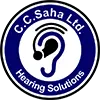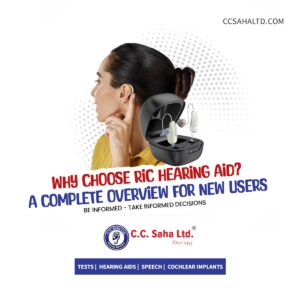
Why choose RIC Hearing Aid? A Complete Overview for New Users.
An in-depth guide to Receiver-in-Canal (RIC) hearing aids for new users. Discover why they’re popular for their discreet design, natural sound, and advanced features.
Hearing aids are transformative devices that restore sound and clarity to life but also require proper care to ensure durability and peak performance. With modern advancements like Bluetooth connectivity and rechargeable batteries, today’s hearing aids are more efficient and user-friendly but also have specific maintenance needs.
At CC Saha Clinics, Kolkata’s trusted hearing care provider for over 90 years, we guide first-time users, parents of children using hearing aids, and experienced users to maintain these advanced hearing aid devices to prevent damage and use them for longer device life. This article focuses on how to prevent hearing aid damage, with insights tailored to the latest technology.
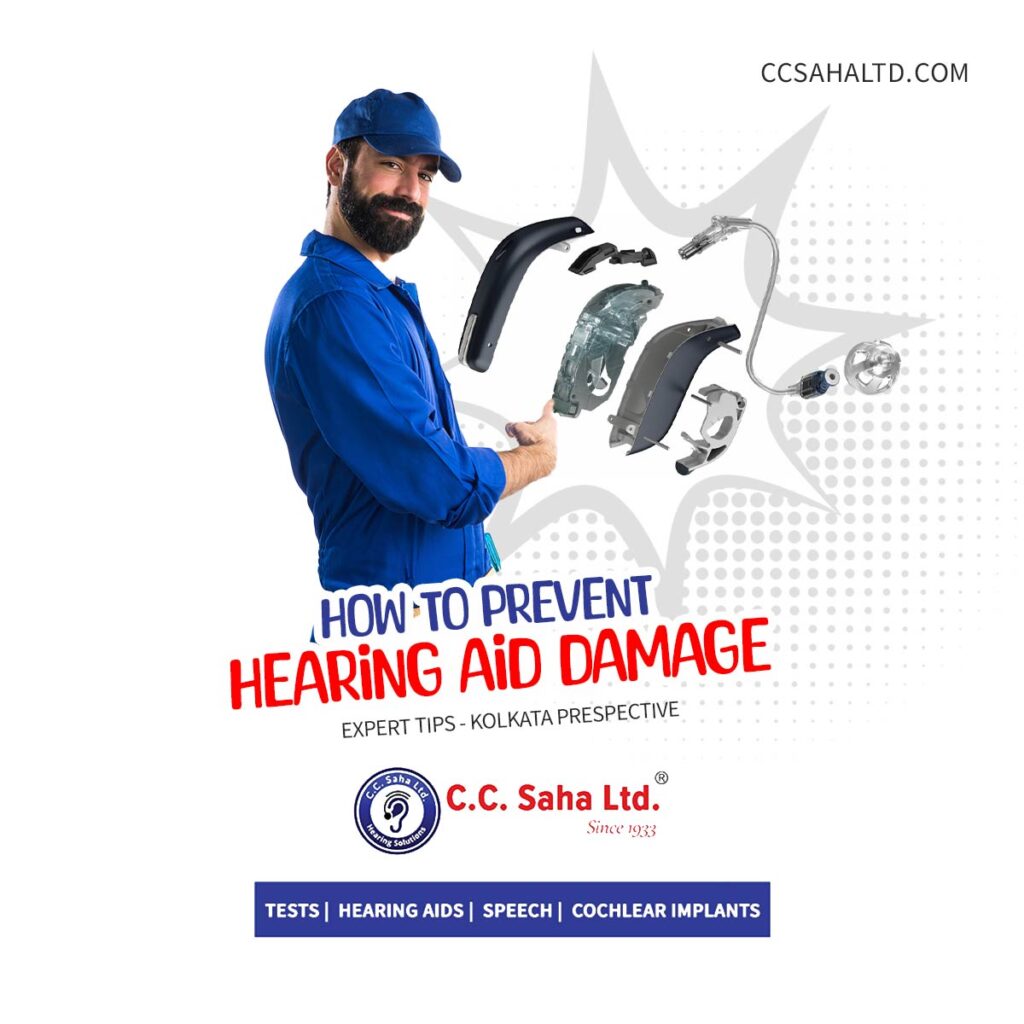
Modern hearing aids, equipped with Bluetooth connectivity and rechargeable batteries, have revolutionized the hearing experience. These advanced devices allow seamless streaming of calls, music, and TV audio, as well as eco-friendly battery options that eliminate the need for frequent replacements. However, their sophistication comes with a trade-off: these devices are highly sensitive to mishandling, environmental factors, and lack of maintenance.
Without proper care, modern hearing aids can face issues like moisture damage, connectivity problems, or battery malfunctions, resulting in costly repairs or even device replacements. Considering that high-quality hearing aids can range from ₹50,000 to ₹3,00,000 or more, improper handling not only risks your hearing health but also your wallet.
Neglecting routine care can lead to a cascade of issues:
Frequent Repairs: Moisture, dirt, or physical impact can damage sensitive components like microphones, receivers, and Bluetooth chips. Each repair can cost anywhere from ₹2,000 to ₹10,000 depending on the damage.
Battery Replacement Costs: Misusing rechargeable batteries or chargers can significantly reduce battery life. Replacing batteries in high-end rechargeable models can cost upwards of ₹5,000.
Connectivity Problems: Bluetooth functionality relies on delicate software and hardware integration. Regular updates and maintenance can prevent expensive troubleshooting visits, which often cost ₹1,000–₹3,000 per session.
Shortened Device Lifespan: A poorly maintained hearing aid may need replacement years earlier than expected, adding more to your expenses.
On the other hand, simple maintenance practices—like cleaning the device daily, storing it safely, and scheduling professional check-ups—can save you thousands annually by preventing unnecessary repairs and extending your hearing aid’s lifespan.
Imagine your hearing aid breaking down just before an important meeting or a family celebration. Beyond the financial implications, there’s the stress of being disconnected from the world around you. At CC Saha Clinics, we frequently meet users who regret not taking preventive steps earlier.
Both traditional and modern hearing aids face similar risks, but the impact can be more pronounced in today’s advanced devices due to their delicate electronic components and software reliance. Below, we’ll explore these causes in detail, how they affect your hearing aids, and how they can be resolved—both at home and professionally at CC Saha Clinics.
What Happens?
How to Solve this at Home:
Professional Solution at CC Saha Clinics:
What Happens?
How to Solve this at Home:
Professional Solution at CC Saha Clinics:
What Happens?
How to Solve this at Home:
Professional Solution at CC Saha Clinics:
What Happens?
How to Solve this at Home:
Professional Solution at CC Saha Clinics:
What Happens?
How to Solve this at Home:
Professional Solution at CC Saha Clinics:
Bluetooth Devices: Moisture can damage Bluetooth circuits. Use hearing aid dehumidifiers, especially in humid cities like Kolkata.
Avoid exposure to water and perspiration. For workouts, use sweatbands or moisture-resistant covers.
Always hold hearing aids with clean, dry hands, especially when inserting or removing them.
Place them on soft surfaces during cleaning to prevent accidental drops.
For Bluetooth devices, ensure microphone ports and receivers are free from dust and earwax. Use a soft, dry cloth and recommended cleaning tools.
For rechargeable hearing aids, wipe the charging contacts regularly to avoid dirt build-up that could hinder charging.
Charge your hearing aids overnight or as advised by your audiologist. Avoid overcharging, which can affect battery longevity.
Use only the original charger provided with your device. Generic chargers can overheat or damage batteries.
If you won’t use your hearing aids for a while, store them at 40–50% charge to preserve battery health.
Keep your smartphone or paired device within the recommended range for Bluetooth to function effectively.
Avoid pairing your hearing aids with multiple devices simultaneously, as it may cause connectivity issues.
Update your hearing aid firmware regularly through the app provided by the manufacturer.
Schedule routine maintenance at CC Saha Clinics to check for software updates, hardware functionality, and professional cleanings.
Our Prince Anwar Shah Road Brilliant Sound Galaxy, the only one in Eastern India, offers state-of-the-art diagnostics and care for advanced hearing aids.
Modern hearing aids for children often include Bluetooth features for streaming educational content or remote programming. To keep your child’s hearing aids safe:
No, moisture can damage Bluetooth circuits. Use moisture-resistant covers or remove your hearing aids in wet conditions.
Gently wipe the charging contacts with a dry, soft cloth. Avoid using water or cleaning agents.
This can occur due to outdated software or pairing with multiple devices. Update your firmware and disconnect from unused devices.
Yes, overcharging can degrade battery performance. Follow the charging guidelines provided by your audiologist.
Keep your smartphone or paired device within 10 meters and avoid physical barriers like walls or furniture.
Check the charger for dirt or debris and clean it if necessary. If the issue persists, visit CC Saha Clinics for professional assistance.
While it’s possible, it’s best to pair with only essential devices to prevent connectivity issues.
Avoid letting the battery drain completely and store unused devices at partial charge.
Yes, updates improve device performance and add new features. Visit CC Saha Clinics for assistance with firmware updates.
Keep it away from liquids, clean it regularly, and ensure it’s in a stable location to prevent falls.
At CC Saha Clinics, we specialize in maintaining and servicing all types of hearing aids, from basic models to the latest Bluetooth-enabled and rechargeable devices. With locations across Kolkata—Esplanade, Prince Anwar Shah Road, Salt Lake, Dunlop, and Barasat—as well as in Burdwan and Paschim Midnapore, we are Eastern India’s most trusted hearing care provider.
Protect your hearing aids and enjoy uninterrupted sound. Visit us today for expert maintenance and guidance!

An in-depth guide to Receiver-in-Canal (RIC) hearing aids for new users. Discover why they’re popular for their discreet design, natural sound, and advanced features.

Uncover how Noise Cancelling Hearing Aids for Seniors in Kolkata are transforming the lives of Boomers and Gen X, providing unparalleled clarity in noisy environments and improving overall quality of life.
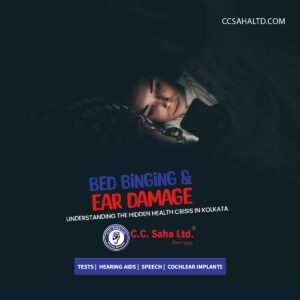
Discover how “bed binging” with devices like earphones can lead to irreversible hearing loss. Learn to protect your ears from damage.
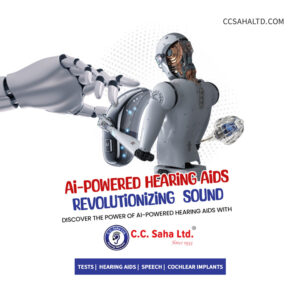
Step into the future of hearing with AI-Powered Hearing Aids. This revolutionary technology goes far beyond simple amplification, offering personalized sound experiences, seamless smart device integration, and addressing the stigma often associated with hearing loss. Discover how CC Saha Ltd. can help you unlock a world of enhanced sound.

Discover comprehensive stuttering treatment for adults and children at CC Saha Ltd. Esplanade Clinic in Kolkata. Learn how expert therapy, personalized plans, and a supportive environment can help overcome stuttering and build lasting communication confidence, inspired by King George VI’s journey.

The unique climate of Kolkata, with its characteristic humidity, can present specific challenges for hearing aid batteries. Understanding the nuances of battery types, whether disposable or rechargeable, can significantly extend their life and the performance of your devices. Let’s delve into the best practices that will keep your hearing aids powered up and you connected to the world. At CC Saha Ltd., we believe in empowering you with knowledge, and these hearing aid battery tips for Kolkata are a testament to that commitment.
#HearingAidCare #PreventDamage #Phonak #Signia #ReSound #HearingAids #Kolkata #CCSahaClinics #HearingSolutions #DeviceProtection #HearingHelp
